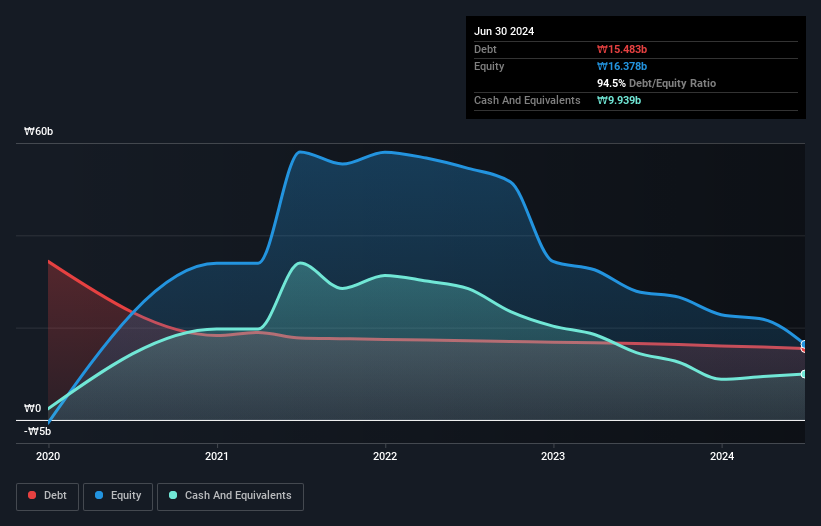- South Korea
- /
- Beverage
- /
- KOSDAQ:A276730
Here's Why Jeju Beer Company (KOSDAQ:276730) Can Afford Some Debt

The external fund manager backed by Berkshire Hathaway's Charlie Munger, Li Lu, makes no bones about it when he says 'The biggest investment risk is not the volatility of prices, but whether you will suffer a permanent loss of capital.' When we think about how risky a company is, we always like to look at its use of debt, since debt overload can lead to ruin. We note that Jeju Beer Company, Limited (KOSDAQ:276730) does have debt on its balance sheet. But the real question is whether this debt is making the company risky.
When Is Debt A Problem?
Generally speaking, debt only becomes a real problem when a company can't easily pay it off, either by raising capital or with its own cash flow. Part and parcel of capitalism is the process of 'creative destruction' where failed businesses are mercilessly liquidated by their bankers. While that is not too common, we often do see indebted companies permanently diluting shareholders because lenders force them to raise capital at a distressed price. Of course, debt can be an important tool in businesses, particularly capital heavy businesses. When we examine debt levels, we first consider both cash and debt levels, together.
Check out our latest analysis for Jeju Beer Company
What Is Jeju Beer Company's Net Debt?
As you can see below, Jeju Beer Company had ₩15.5b of debt at June 2024, down from ₩16.6b a year prior. On the flip side, it has ₩9.94b in cash leading to net debt of about ₩5.54b.

A Look At Jeju Beer Company's Liabilities
According to the last reported balance sheet, Jeju Beer Company had liabilities of ₩24.6b due within 12 months, and liabilities of ₩2.38b due beyond 12 months. On the other hand, it had cash of ₩9.94b and ₩2.38b worth of receivables due within a year. So its liabilities total ₩14.6b more than the combination of its cash and short-term receivables.
This deficit isn't so bad because Jeju Beer Company is worth ₩34.6b, and thus could probably raise enough capital to shore up its balance sheet, if the need arose. But we definitely want to keep our eyes open to indications that its debt is bringing too much risk. There's no doubt that we learn most about debt from the balance sheet. But you can't view debt in total isolation; since Jeju Beer Company will need earnings to service that debt. So when considering debt, it's definitely worth looking at the earnings trend. Click here for an interactive snapshot.
In the last year Jeju Beer Company wasn't profitable at an EBIT level, but managed to grow its revenue by 4.8%, to ₩22b. That rate of growth is a bit slow for our taste, but it takes all types to make a world.
Caveat Emptor
Over the last twelve months Jeju Beer Company produced an earnings before interest and tax (EBIT) loss. Its EBIT loss was a whopping ₩6.0b. Considering that alongside the liabilities mentioned above does not give us much confidence that company should be using so much debt. Quite frankly we think the balance sheet is far from match-fit, although it could be improved with time. Another cause for caution is that is bled ₩6.9b in negative free cash flow over the last twelve months. So suffice it to say we consider the stock very risky. The balance sheet is clearly the area to focus on when you are analysing debt. However, not all investment risk resides within the balance sheet - far from it. For example, we've discovered 4 warning signs for Jeju Beer Company (1 can't be ignored!) that you should be aware of before investing here.
Of course, if you're the type of investor who prefers buying stocks without the burden of debt, then don't hesitate to discover our exclusive list of net cash growth stocks, today.
Valuation is complex, but we're here to simplify it.
Discover if HanWool & Jeju might be undervalued or overvalued with our detailed analysis, featuring fair value estimates, potential risks, dividends, insider trades, and its financial condition.
Access Free AnalysisHave feedback on this article? Concerned about the content? Get in touch with us directly. Alternatively, email editorial-team (at) simplywallst.com.
This article by Simply Wall St is general in nature. We provide commentary based on historical data and analyst forecasts only using an unbiased methodology and our articles are not intended to be financial advice. It does not constitute a recommendation to buy or sell any stock, and does not take account of your objectives, or your financial situation. We aim to bring you long-term focused analysis driven by fundamental data. Note that our analysis may not factor in the latest price-sensitive company announcements or qualitative material. Simply Wall St has no position in any stocks mentioned.
About KOSDAQ:A276730
HanWool & Jeju
Engages in the manufacture of alcoholic beverages in South Korea.
Flawless balance sheet low.
Market Insights
Community Narratives



